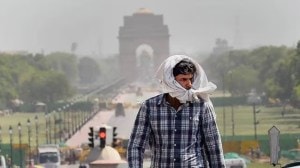- India
- International
Cooperation with Saudi could shield India’s oil and gas assets against Pakistani threat
Pakistan is heavily in debt to Saudi Arabia and it depends hugely on the kingdom’s largesse to avoid economic collapse. Saudi Arabia has consequently considerable leverage over Pakistan and the latter in turn cannot afford to ignore Saudi economic interests when war gaming an offensive strategy against India.
 Pakistan is dependent on Saudi largesse to avoid economic collapse. It cannot afford to ignore the kingdom’s economic interests. (Illustration by C R Sasikumar)
Pakistan is dependent on Saudi largesse to avoid economic collapse. It cannot afford to ignore the kingdom’s economic interests. (Illustration by C R Sasikumar)
Two unconnected “developments” and one “fact” lead me to suggest India should deepen its economic linkages with Saudi Arabia through interlocking cross country investments. The first development is the recent attacks on Saudi Arabia’s oil and gas infrastructure. The second is the muscular , albeit irresponsible, anti Indian diatribe by the Pakistani leadership. They have introduced the nuclear option in their language. The “fact” is the location of a substantial part of our petroleum assets on or offshore our Western coastline. In my view, when seen through a common lens, these three matters reveal a heightened security risk scenario for India but also offer a non-military option for mitigating the consequential outcome. Saudi Arabian investments in India’s petroleum infrastructure and vice versa lie at the core of this option .
Saudi Arabia’s oil and gas infrastructure have been attacked repeatedly over the past several months. On May 12, four oil tankers, two of which belonged to Saudi Arabia were damaged by limpet mines. On May 14, the East West oil pipeline that runs for 1,200 km across the Arabian peninsula was bombed. On August 17 , its super giant Shaybah oil field was sabotaged. And on September 14, unmanned drones destroyed the Abqaiq oil processing facilities and the giant Khurais oil field. This latter attack took out 5.7 mbd or 60 per cent of Saudi Arabia’s production of 9.8mbd. It was the largest disruption of oil supplies ever .
The Abqaiq attack compelled India to contemplate drawing on its strategic reserves and also look for alternative supplies. Fortunately, the supply shortfall was made up quickly and prices which had shot up by 12 per cent in the immediate aftermath returned to pre-attack levels within days . India did not suffer greatly from this disruption.
The attack also compelled India to ask questions related to Middle East geopolitics. Is the status quo sustainable? How might the US react? Would they limit their response to the non-violent options of sanctions and cyber attacks? Or would they support a (covert or overt) retaliatory attack on Iranian assets? (The Kharg island facilities would be a proportionate target). India has admitted it has no clear answers to these questions. In fact, it appears, no one does. US President Donald Trump is talking of “maximum pressure” but he has refrained from a military response. Iran has said “no war, no negotiation” but it has signalled that it may be amenable to the resumption of talks.
The attack has also compelled reflection on the state of the security of India’s oil and gas infrastructure. The Saudi assets were ringed by sophisticated US Patriot anti-missile defence systems. Yet, 17 facilities in Abqaiq and Khurais were hit by 25 low flying cruise missiles. What does this say about the sanctity of defence systems against the forces of weaponised artificial intelligence. How vulnerable are our oil and gas assets on the western coast? Specifically, the Mumbai High oil and gas fields, the Jamnagar refinery complex and the LNG regassification terminals in Dahej, Hazira, Dabhol and Cochin. What, if any, are the steps that India should take to tighten security safeguards, given the heightened anti-India rhetoric by Pakistan. And, perhaps most important, what should it do to lengthen the odds of an attack against such facilities?

It is in the context of this last question that I suggest that India should encourage cross country investments with Saudi Arabia.
Pakistan is heavily in debt to Saudi Arabia and it depends hugely on the kingdom’s largesse to avoid economic collapse. Saudi Arabia has consequently considerable leverage over Pakistan and the latter in turn cannot afford to ignore Saudi economic interests when war gaming an offensive strategy against India. Were the Saudis invested in India oil and gas assets, it might deter Pakistan from bringing these assets into their strategic calculus.
In this regard, there are already two initiatives on the anvil. If even one of them is successful, Saudi Arabia would acquire a material stake in this sector. One is the 40 billion dollar joint venture refinery project in Ratnagiri. The partners are Aramco, Abu Dhabi National Oil Company (ADNOC) and Indian Oil. This project is currently stalled because of land acquisition and environmental clearance. And as matters stand, it could be years before it sees the light of day. All parties, however, remain committed. The second is the investment by Saudi Aramco in Reliance Industries. Mukesh Ambani has announced that Reliance and Aramco are in discussion about the acquisition of a 20 per cent stake by Aramco in these businesses. The commercial logic for Aramco is compelling. It would secure a captive outlet for 5,00,000 barrels of crude oil a day and a foothold in India’s downstream market. For India (as distinct from Reliance), the strategic logic is comparably compelling. It would give Aramco a material stake in the petroleum sector.
There is a third initiative, albeit in the opposite direction that should also be considered. This relates to Saudi Aramco’s planned offering thorough an international public offer (IPO) of up to 5 per cent of its shares to the public. The Crown Prince of Saudi Arabia, Mohammed Bin Salman (MBS) is driving this initiative. Its success is a matter of great personal importance to him especially since the financing of his economic plan is centred around the revenues raised through the IPO. The IPO may get delayed because of the attacks and the escalating tensions in the region, but when it is finally announced, India should look at it through a financial and strategic lens. The purchase of even a small stake would please MBS and deepen his commitment to prevent Pakistani adventurism.
No one should assume that such cross country investments will provide an iron clad guarantee. There can be no such assurance. Pakistan’s behaviour is now so influenced by political emotions, domestic pressures and jingoistic fervour that there is little room for rational logic and dialogue. But as any student of history will know, it does not take much for irresponsible rhetoric to translate into violence. India should consequently pursue any and all ideas that lengthen the odds of such an outcome. A “Saudi buffer” is one such idea.
This article first appeared in the print edition on October 6, 2019 under the title ‘Over The Barrel: A buffer called Saudi Arabia.’ The writer is chairman & senior fellow, Brookings India
EXPRESS OPINION
More Explained
Apr 26: Latest News
- 01
- 02
- 03
- 04
- 05











































